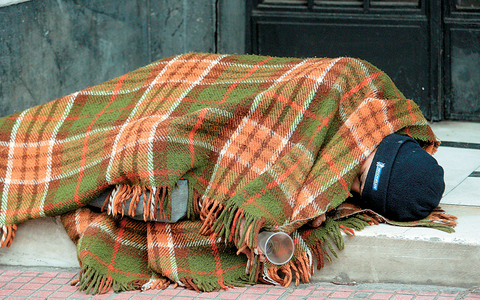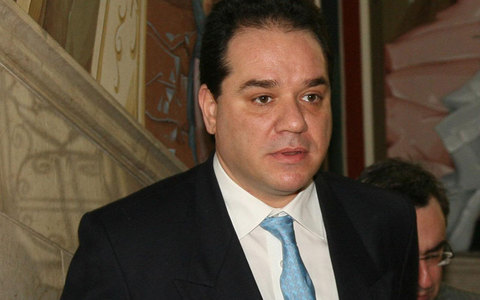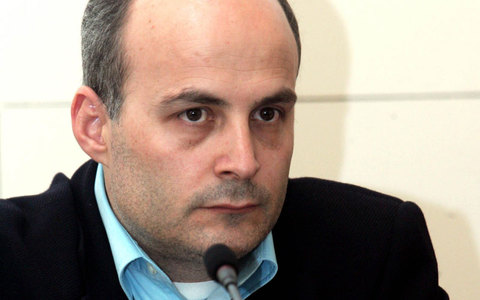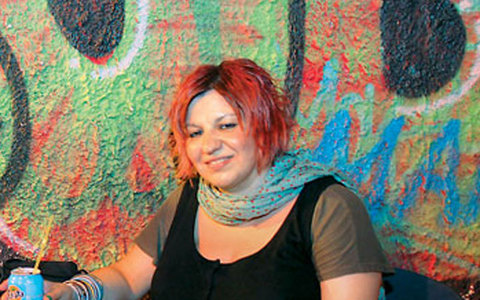Scenes of pain and misery on Christmas Eve in Athens. The development of events in Greece is dramatic, the number of "the new poor" is increasing, the number of "the new homeless" has already exceeded 20,000, and now another phenomenon is being added to the sad list, which, with every passing day, is taking on even more alarming proportions.
These are the "new hungry", people who literally until yesterday led a comfortable life, which, however, suddenly slipped from their hands, and now they are struggling to somehow provide their own daily food.
City streets are flooded by a huge number of poor people who are looking for a warm dish in public kitchens, in stores for the poor, or worse - in dustbins.
A few years ago, the term "nouveau riche" existed in Greece. These were people who, at least ostensibly, were prospering. A few years later, another term was added to the dictionary: "the new poor" or "the new homeless". Soon, the living conditions worsened for further thousands of Greek citizens, resulting in the term "the new hungry".
Furthermore, the situation is escalating, according to Athens Municipality officials dealing with social programmes for needy families in the capital. Just a year ago, everyone was talking about the "new poor" or "new homeless" by analysing their profile, what their life had been like before and where they had ended up. But before Greek society recovered from the first shock, yet another consequence of the difficult economic situation emerged. Thousands of people are constantly finding themselves stranded because they cannot meet even their basic needs for survival.
Most of them have their own house and live in it, in the majority of cases without electricity, and seek food from various municipal social programmes. Youth, seniors, large families are flocking to join the queues at the social services in order to be involved in assistance programmes. Data revealing the sad reality of the centre for the homeless in Athens Municipality are indicative of the situation. More than 1,000 families who have no access to food, are being serviced by the municipality of Athens, which provides them with a packet of food on a daily basis.
According to George Apostolopoulos, Director of the Centre for Admission and Solidarity with Athens Municipality, the needs of this particular class of people are increasing dramatically, and most of them are now Greeks. "The new hungry" do not come to the municipal public kitchens, but are trying to join the lists for food distribution.

Distribution of food
The fact that, in the first six months of 2011, the food shop for socially disadvantaged distributed food products to 486 families, and in the second half - to 583 needy, is indicative. A large increase was registered in the first half of 2012, when the number of the needy reached 743. Social services to municipalities estimated that, due to the economic crisis, whole families are now out on the street, and the number of people living in cardboard boxes, on benches and under bridges in Zappeion, Koumoundourou, Gazi, etc., cannot be determined.
Festive dinners
On Christmas and New Year's Eve the Centre for Admission and Solidarity with Athens Municipality will arrange festive tables in Rouf Gym (on the corner of Piraeus and 69 Ehelidon Street) for the homeless and those who are in need. The festive Christmas meal will include turkey, cakes and music. There will be a similar New Year's feast on 1 January, as well. According to Director of the Centre George Apostolopoulos, last year's Holidays at Rouf were visited by 300 people, and the capacity of the gym is for 600 people.
Shocking stories of people in poverty
Every day, George Apostolopoulos encounters countless stories of people who have lost everything, who are living under the assistance of the municipality and the church. "Over the past year and a half, ever since I've been Director of the Centre, I have been noticing that, with every passing day, the situation of our fellow citizens affected by the economic crisis worsens," emphasised Apostolopulos and added: "it is really thrilling to see people struggling for survival, people, whose finances were in good condition, even, in the majority of cases, owners of quite a large amount of property, but, suddenly, they have nothing to eat." A typical case is that of a wealthy lady from the luxury neighbourhood of Kolonaki, who has now ended up in a situation in which she is living due to the assistance provided by the municipality.
Equally striking stories include those of "large families with no electricity in their homes, young people who are unemployed and often homeless, pensioners with low pensions, suffering immigrants seeking a ray of hope in their lives."
NGO Apostles to the Archbishopric distributes daily 10,000 portions of food
"Nobody left without food, nobody left without medicines" is the motto of NGO Apostles (a Mission) to the Archbishopric of Athens, which continues to support families living below the poverty line. As Director of Apostles Konstantinos Dimtsas noted, the crisis has spread its tentacles throughout the country, and the worst is that, according to forecasts, 2013 will be an even more difficult year.
"The number of applications for food packages reached 7,000, but we are able to distribute only 4,000," said Dimtsas, adding that there is "a tragic increase in the number of Greeks who want help, mainly in the productive age of 40-55 years."
In one year alone, 372,000 kg of food products were collected, and to date 337,050 kg of basic necessities have been distributed. Every day, Apostles distributes 10,000 portions of food to 5,000 people who live in poverty. Especially for large families, in 2012, 3,000 packages of food were distributed to 777 families.

Konstantinos Dimtsas
Living conditions are worsening continuously across the country, and, a few days ago, representatives of Apostles visited the town of Kilkis, where they gave 750 kg of food.
Doctors Without Borders to start working in Greece
Apostolos Veizis, Head of Doctors Without Borders Programmes: "For Doctors Without Borders, the main criterion for intervention and activity includes urgent needs of people and lack of access to medical care. And in Greece, an increasing number of people are being excluded from the health care system and are living in inadequate conditions.

Apostolos Veizis
According to calculations, but also according to estimates by experts in the field of public health, the biggest gaps are now being recorded in the prevention, diagnosis and treatment of infectious diseases that are associated with living conditions and social exclusion, such as tuberculosis, AIDS, malaria.
Therefore, we will start working at the centre of Athens, as our goals include medical needs of the most vulnerable groups and addressing the "diseases of poverty", in collaboration with already existing initiatives of various government authorities and civil society.
Much of the population affected by the crisis is focused in the centre of Athens and is in danger of infectious diseases.
Specific populations at risk of these diseases are groups of high mobility or behaviour problems. These groups need special treatment and care, through a tailored approach of diagnosis and treatment.
''The purpose of Doctors Without Borders is to provide homeless, drug addicts, uninsured Greeks and immigrants access to medical services for the diagnosis and treatment of diseases such as tuberculosis, AIDS, malaria and others."
"Civil society should support the homeless"
Ada Alamanou, Programme Manager of a programme for support of the homeless with the NGO Klimaka:

"What is worrying is the fact that the identity of people who have serious problems with their survival is changing. These are individuals who never envisaged the possibility of ending up there. Many of them have even lost their homes. Their main needs are no longer just finding food, but also shelter, medical care, and only then a job. The majority of people who are living near the poverty line, and many of those who are living under it, are not indifferent to the future, they are active citizens. At the NGO Klimaka, we provide food to more than 200 people, and our greatest needs include warm clothes, jackets, heating appliances, sanitary materials, etc.
The most optimistic thing we are observing is that solidarity is now being felt more and more often, and it is filling the "holes" left by government action. Civil society is perhaps the most important answer to all these problems."